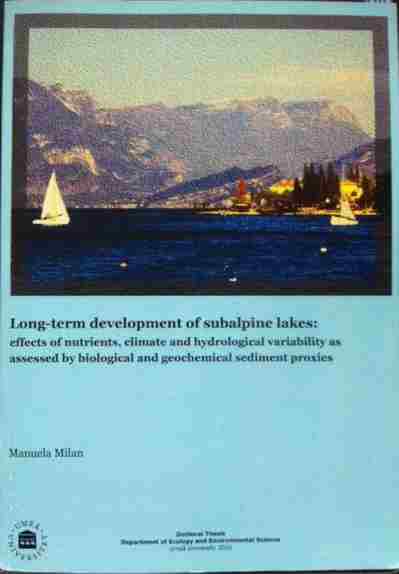Manuela defended her PhD in February and took some well-deserved time off before telling us about it! As you can see, she really made the most of the IRSAE network!
I defended my PhD thesis entitled “Long-term development of subalpine lakes: effects of nutrients, climate and hydrological variability as assessed by biological and geochemical sediment proxies” the 26th February 2016 at the Department of Ecology and Environmental Science (EMG) – Umeå University.
The aim of my work was to reconstruct the ecological evolution of two Italian subalpine lakes (Lake Garda and Lake Ledro) over the past several hundred years. Local anthropogenic forcings, such as nutrients, and climate impacts have an impact on lakes and catchment areas. In order to disentangle the different effects, a multi-proxy and multi-site approach was applied on the two studied lake-catchment systems. Biological indicators (sub-fossil pigments, diatoms and Cladocera) were used to reconstruct changes in the aquatic food web and to define the lake reference conditions. On the other hand, the quantitative information on the different physical or chemical processes affecting both ecosystems were provided by geochemical methods, i.e. wavelength-dispersive X-ray fluorescence spectroscopy (WD-XRF).
I enjoyed my project as it allowed me to learn different technique in the paleolimnological field, to growh up as a paleolimnologist, and to visit different research centres and Universities in Europe, thanks also to IRSAE grants. In fact, even if I spent most of my time at the Foundation E. Mach (Italy) under the supervision of Dr. Monica Tolotti, I also spent three months every year at the Department of Ecology and Environmental Science – Umeå University in order to meet my supervisors, Doc. Christian Bigler and Prof. Richard Bindler, and to use innovative instruments. Moreover I visited regularly my fourth supervisor, Prof. Krystyna Szeroczyńska, at the Research Centre in Warsaw – Polish Academy of Sciences, to learn how to identify subfossil Cladocera remains in the sediments, since she is one of the major expert at global level. During my work I could also attend numerous conferences on ecology, limnology and paleolimnology, which helped me to complete/integrate my project.
As for all the PhD students, my educational path had hard and discouraged moments, but the gratifications and the successes made me proud of myself. I liked my PhD work and I’m really satisfied by my thesis.
Finally, I would like to thank my IRSAE supervisor in FEM, Dr. Francesca Cagnacci, who introduced me to IR SAE network and helped me with grant applications and reports.



